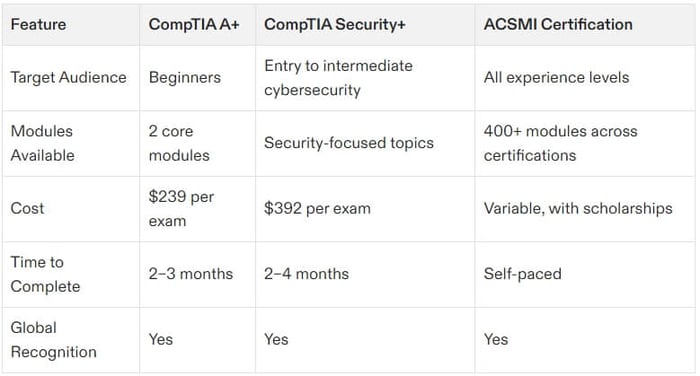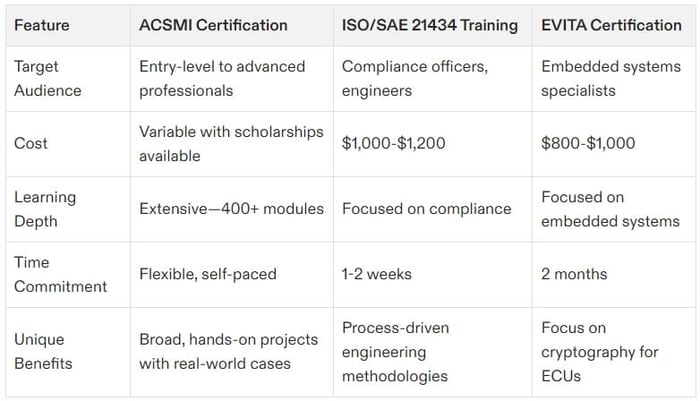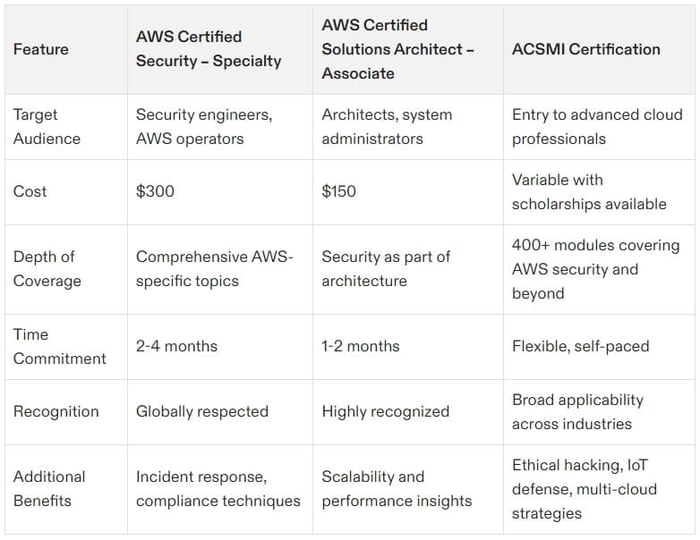Table of Contents
- What Determines the Difficulty of Cybersecurity Certifications?
- 1. Certification Tier
- 2. Exam Format
- 3. Domains Covered
- 4. Time Commitment
- The Most Difficult Cybersecurity Certifications: A Closer Look
- How to Manage the Difficulty of Cybersecurity Certifications
- ACSMI: Simplifying Your Certification Path
- Real-Life Success Story: Overcoming the Challenges of Advanced Certifications
- Conclusion: Cybersecurity Certifications Are Achievable with the Right Preparation
- FAQs About Cybersecurity Certification Difficulty
The cybersecurity field continues to grow at an extraordinary pace, offering a wide range of opportunities for professionals equipped with the right skills and certifications. However, aspiring cybersecurity specialists often face a crucial question when planning their certification path: How hard are cybersecurity certifications to achieve? Understanding the difficulty of a Cybersecurity Certification Test is essential to prepare mentally, plan your study approach, and make informed decisions about your career path.
What Determines the Difficulty of Cybersecurity Certifications?
No two cybersecurity certifications are alike, and their difficulty varies based on several key factors. Understanding these factors can help you decide where to start and how to tackle the most challenging exams. Here’s a breakdown of the key determinants of certification difficulty:
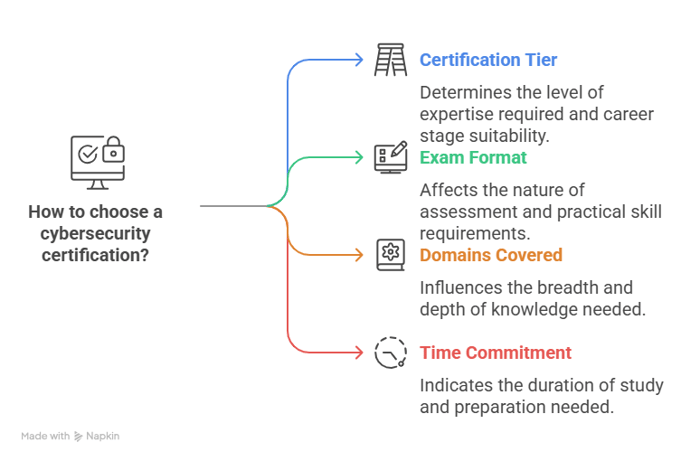
1. Certification Tier
Cybersecurity certifications are generally divided into three levels based on career stage and expertise. Each tier introduces increasing complexity:
Beginner-Level: These certifications require basic, foundational knowledge. Examples include CompTIA Security+ and ACSMI Certified Security Analyst. These certifications are ideal for those just entering the field.
Intermediate-Level: These certifications require some technical experience and a deeper understanding of security principles. Examples include Certified Ethical Hacker (CEH) and Certified Information Systems Auditor (CISA).
Advanced-Level: These certifications are intended for seasoned professionals and typically require a combination of leadership skills and deep technical expertise. Examples include Certified Information Systems Security Professional (CISSP) and Offensive Security Certified Professional (OSCP).
The higher the tier, the more complex the exam and its requirements, with prerequisites often adding to the difficulty.
2. Exam Format
The format of the exam plays a significant role in the difficulty level:
Multiple-Choice Exams: These exams are generally easier, focusing on theoretical knowledge and offering a broad range of topics. CompTIA Security+, for example, uses this format, making it accessible for newcomers to cybersecurity.
Hands-On Exams: Some certifications require candidates to demonstrate practical skills in real-world scenarios. OSCP, for example, includes a hands-on exam where candidates must exploit vulnerabilities on a live system. These exams are considered more challenging due to their technical depth and real-time performance requirements.
3. Domains Covered
The breadth and depth of the domains covered in the certification exam can affect its difficulty:
Specialized Certifications: Certifications focusing on specific areas like cloud security or penetration testing may be easier if you have expertise in those niches.
General Certifications: Broader certifications, like CISSP, require knowledge across a wide array of cybersecurity domains, such as risk management, cryptography, and software development security. This makes them more challenging as they require mastery of multiple areas.
4. Time Commitment
The time required for preparation significantly impacts the perceived difficulty. Some certifications, such as the It Specialist Cybersecurity Certification, require only a few weeks of study, while others might demand months of preparation. The larger the syllabus and the more complex the concepts, the more time you’ll need to devote to studying.
The Most Difficult Cybersecurity Certifications: A Closer Look
Some cybersecurity certifications are notoriously more difficult than others. Below, we’ve broken down some of the most commonly cited difficult certifications and their key characteristics:
CISSP (Certified Information Systems Security Professional)
Difficulty Level: High
Why: The CISSP certification is known for its complexity, as it covers eight domains of knowledge, including risk management, software development security, and disaster recovery. The 6-hour exam tests your ability to manage security in large-scale enterprises, and time management is crucial for success.
Preparation Time: Typically requires 3–6 months of study due to the breadth of topics and depth of knowledge required.
OSCP (Offensive Security Certified Professional)
Difficulty Level: High
Why: The OSCP is a hands-on certification that focuses on penetration testing. Candidates must exploit vulnerabilities in a live system during the exam, which requires significant preparation, technical skill, and practical experience.
Preparation Time: Expect to spend several months, particularly if you are new to penetration testing.
CEH (Certified Ethical Hacker)
Difficulty Level: Medium
Why: The CEH focuses on theoretical knowledge about ethical hacking tools and techniques. While the content is manageable, hands-on experience with penetration testing tools is required to fully grasp the concepts.
Preparation Time: Typically requires 2–3 months of study and hands-on practice.
CompTIA Security+ & ACSMI Certified Security Analyst
Difficulty Level: Low to Medium
Why: Both CompTIA Security+ and ACSMI Certified Security Analyst certifications are beginner-friendly, making them ideal for those starting their cybersecurity journey. They focus on foundational cybersecurity knowledge, such as network security and threat management.
Preparation Time: These certifications generally require 1–3 months of study, depending on prior knowledge.
How to Manage the Difficulty of Cybersecurity Certifications
If the thought of tackling a challenging certification feels overwhelming, don’t worry! Here are some tips to make the process more manageable:
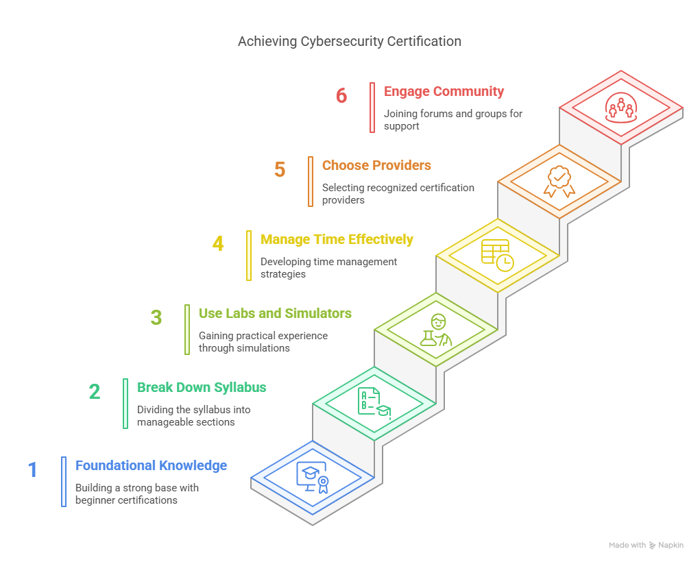
1. Start with Foundational Knowledge
It’s important not to jump straight into the hardest certifications without building a strong foundation. Start with beginner-level certifications like CompTIA Security+ or ACSMI Certified Security Analyst. These certifications will give you a solid understanding of cybersecurity concepts and prepare you for more advanced exams.
2. Break Down the Syllabus into Manageable Chunks
Each certification has a broad syllabus that can seem daunting. Break the syllabus into smaller, more manageable sections and focus on mastering one domain at a time. This will prevent you from feeling overwhelmed and help you stay on track.
3. Leverage Labs and Simulators
Hands-on certifications like OSCP and CEH require practical skills that can only be developed through practice. Use virtual labs and simulators to gain real-world experience. Providers like ACSMI offer comprehensive labs designed to simulate real cybersecurity scenarios, giving you the opportunity to practice in a safe environment.
4. Manage Your Time Effectively
Time management is critical, especially for exams like CISSP and OSCP, where time pressure can be intense. Take practice exams and timed quizzes to build your confidence and develop strategies for managing your time during the actual exam.
5. Choose Recognized Providers
Not all certification programs are created equal. Make sure you choose a well-established provider like ACSMI, which offers a step-by-step learning path tailored to your certification goals. With 400+ modules, ACSMI helps you prepare efficiently with technical deep dives, mock exams, and real-world labs.
6. Engage with the Cybersecurity Community
Join online forums, attend webinars, or participate in Discord groups where you can discuss your preparation, share resources, and get advice from other professionals. Having a support system can help reduce stress and motivate you to stay on track.
ACSMI: Simplifying Your Certification Path
ACSMI offers a simplified, modular learning approach that allows you to target the exact skills and knowledge required for your certification. Whether you’re preparing for CompTIA Security+ or CISSP, ACSMI’s 400+ modules ensure that you focus on the most relevant topics, maximizing your preparation and efficiency.
Real-Life Success Story: Overcoming the Challenges of Advanced Certifications
Meet Priya Desai, a cybersecurity professional who recently passed the CISSP exam after months of rigorous preparation. Priya had experience in network security but struggled with the vast syllabus. By breaking the content into manageable parts and utilizing ACSMI’s modules, she managed to pass her exam on the first attempt. Today, Priya works as a Senior Security Consultant and mentors aspiring professionals.
Conclusion: Cybersecurity Certifications Are Achievable with the Right Preparation
While the difficulty of cybersecurity certifications varies, with the right approach, preparation, and resources, these challenges can be overcome. Start with foundational certifications, break down the syllabus, practice consistently, and choose a reputable provider like ACSMI to guide you through the process.
Remember, persistence is key. With determination and the right tools, you can successfully navigate the difficulty of cybersecurity certifications and take your career to the next level.
FAQs About Cybersecurity Certification Difficulty
1. Is cybersecurity certification difficulty the same for everyone?
No, the difficulty of cybersecurity certifications depends on your existing knowledge and experience. Beginners may find advanced certifications like OSCP or CISSP more challenging than seasoned professionals.
2. How do hands-on certifications differ in difficulty?
Hands-on certifications like OSCP require candidates to demonstrate practical skills in real-world environments. These are generally harder than theoretical certifications because they test actual problem-solving abilities in live systems.
3. Can ACSMI help simplify challenging certifications?
Yes, ACSMI’s modular approach allows you to focus on the most relevant topics for your certification, streamlining your study process and improving your chances of success.
4. How long does it take to prepare for difficult certifications like CISSP?
Preparation for CISSP typically takes 3–6 months, but this can vary depending on your prior knowledge and available study time.
5. Are practice tests worth it?
Absolutely! Practice tests are invaluable in identifying weak areas, familiarizing yourself with exam formats, and improving time management skills.



